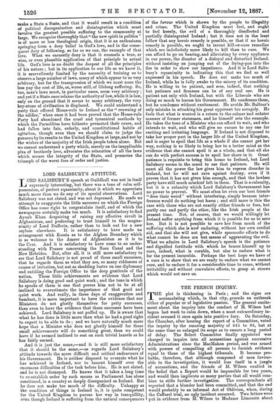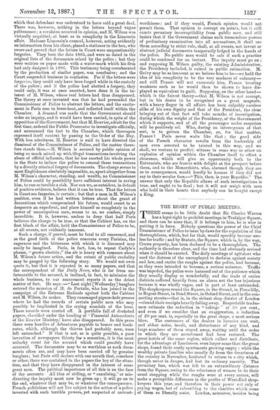THE FRENCH INQUIRY.
MHE plot is thickening in Paris ; and the signs are
accumulating which, in that city, precede an outbreak either of popular or of legislative passion. The general excite- ment about the inquiry into the conduct of M. Wilson had begun last week to calm down, when a most extraordinary in- cident aroused it once again into positive fury. On Saturday, the Chamber, after hearing the report of a Committee, voted the inquiry by the amazing majority of 445 to 84, but at the same time so enlarged its scope as to ensure a long period of delay. The Select Committee finally appointed was charged to inquire into all accusations against successive Administrations since the MacMahon period, and was armed with powers of compelling all persons to furnish evidence equal to those of the highest tribunals. It became pro- bable, therefore, that although composed of men favour- able to the investigation, it would lose itself in a jungle of accusations, and the friends of M. Wilson exulted in the belief that a Report would be impossible for two years, and would then implicate so many parties that all would com- bine to stifle further investigation. The correspondents all reported that a blunder had been committed, and that the end would probably be an informal Act of Oblivion, when, during the Caffarel trial, an ugly incident occurred. Two letters were put in evidence from M. Wilson to Madame Limousin about which that defendant was understood to have said a, great deal. There was, however, nothing in the letters beyond vague politenesses ; a revulsion occurred in opinion, and M. Wilson was virtually acquitted, at least as to complicity in the Limousin affair. Madame IA11100.8111'8 counsel, however, acting evidently on information from his client, placed a stationer in the box, who swore and proved that the letters in Court were unquestionably forgeries. They bore the date 1885, and were so dated in the original lists of the documents seized by the police ; but they were written on paper made with a water-mark which his firm had only designed in 1886. This testimony being corroborated by the production of similar paper, was conclusive ; and the Court suspended business in confusion. For if the letters were forgeries, they could only have been forged while in the custody of the police ; and if the police had abetted a forgery, they could only, it was at once asserted, have done it in the in- terest of M. Wilson, whose real letters had thus disappeared. The theory at once invented was that he had persuaded the Commissioner of Police to abstract the letters, and the excite- ment in Paris rose to fever-heat, and reflected itself within the Chamber. A demand was made that the Government should order an inquiry, and it would have been carried, in spite of the opposition of the Government. but that M. Ranvier, adroit for the first time, ordered the Public Prosecutor to investigate officially, and announced the fact to the Chamber, which thereupon expressed itself content by passing to the Order of the Day. With less adroitness, M. Rouvier is said to have directed the dismissal of the Commissioner of Police, and the matter there- fore stands thus,—M. Wilson is accused by public opinion of being so much mixed up with illegal transactions involving the abuse of official influence, that he has exerted his whole power in the State to induce the police to conceal those transactions by a directly criminal forgery of documents. The charge seems to most Englishmen aleolutely impossible, as, apart altogether from M. Wilson's character, standing, and wealth, no Commissioner
of Police could by possibility have sufficient interest in saving him, to run so terrible a risk. Nor can we, as outsiders, in default of positive evidence, believe that it can be true. That the letters in Court are forgeries, is certain; but that a man in M. Wilson's position, even if he had written letters about the grant of decorations which compromised his future, would resort to so desperate an expedient, and place himself so completely in the power of unscrupulous men, seems to us, we confess, simply incredible. It is, however, useless to deny that half Paris believes the charge to be true, or that the Cabinet has, on the first blush of the affair, held the Commissioner of Police to be, at all events, not evidently innocent.
Such a charge, if proved, must be fatal to all concerned, and as the good faith of the police concerns every Parisian, the eagerness and the bitterness with which it is discussed may easily be imagined. Paris, in fact, has, to repeat Carlyle's phrase, "grown electric ;" the air is heavy with rumours about M. Wilson's future action, and the extent of public credulity may be gauged by the following story. We would not even quote it, but that it is repeated in so many papers, and that the correspondent of the Daily News, who is far from un- favourable to the accused, is inclined, in fact, to minimise the whole business, to our amazement reports it as the driest matter of fact. He says :—" Last night [Wednesday] burglars entered the mansion of M. de Portalis, who has joined in the campaign of the Extreme Radicals against both the Cabinet and DI. Wilson, its maker. They rummaged pigeon-hole presses where he had the records of certain public men who may possibly be implicated in the crying scandals of the hour. These records were carried off. A portfolio full of docketed papers, classified under the heading of Financial Antecedents of the Bouvier Ministry,' have also disappeared. In this press there were bundles of debentures payable to bearer and bank- notes, which, although the thieves had probably seen, were left untouched." If that is not, as is quite possible, a pure invention of newspapers thirsty for a sensation, it is the most unlucky event for the accused which could possibly have occurred. The documents may be as worthless as such docu- ments often are, and may have been carried off by genuine burglars ; but Paris will declare with one mouth that, somehow or other, there was contained in the papers the key of the situa- tion, and that they have disappeared in the interest of some great men. The political importance of all this is on the face of the accounts. All idea of stifling, or "canalising," or mis- directing the inquiry must now be given up ; it will go on to the end, whatever that may be, or whatever the consequences. French politicians will not live subject to the action of a police invested with such terrible powers, yet suspected of untrust- worthiness ; and if they would, French opinion would not permit them. That opinion is corrupt on points, but it still exacts pecuniary incorruptibility from public men, and still insists that if the Government claims such tremendous powers of preliminary examination into all accusations, it shall use them according to strict rule, shall, at all events, not invent or abstract judicial documents temporarily lodged in the hands of the police. No public man would be safe if such a practice could be condoned for an instant. The inquiry most go on ; and supposing M. Wilson guilty, the existing Administration, the Presidency included, is ruined in public estimation. M. Grevy may be as innocent as we believe him to be—we hold the idea of his complicity to be the very madness of calumny— and still France will not exonerate him, France treating weakness such as he would then be shown to have dis- played as equivalent to guilt. Supposing, on the other hand— which is the fairest theory—that hi. Wilson is not corrupt, but in his desire to be recognised as a great magnate, with a heavy finger in all affairs, has been culpably careless alike of his own dignity and that of the President, the clear bringing out of that fact will take months of investigation, during which the weight of the Presidency, of the Government which it supports, and of all the personages under suspicion will be positively nil. Who, during an interregnum of that sort, is to govern the Chamber, or, for that matter, France ? Paris never waits like that ; the good side of the French character revolts from the leadership of men even asserted to be tainted in this way, and we shall, we venture to predict, witness in some way or other an explosion of opinion within the Chamber itself to effect a clearance, which will give an opportunity both to the Extremists, who are frantic with delight at the prospect before them, and to the Monarchists, who, alarmed though they are as to consequences, would hardly be human if they did not say to their secular foes,—" This, then, is your Republic." The answer that only the Republic allows of such investigations is true, and ought to be final ; bat it will not weigh with men who hold in their hearts that anybody can be bought except a King.












 Previous page
Previous page